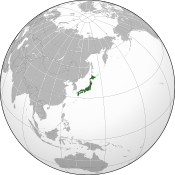Former Japan Prime Minister Kiichi Miyazawa dies at 87
Friday, June 29, 2007

Former Japanese Prime Minister Kiichi Miyazawa died at his home in Tokyo yesterday at the age of 87.
He served as the prime minister of Japan from 1991 to 1993.
Miyazawa was born on October 8, 1919, in Fukuyama, Hiroshima Prefecture. He graduated from Tokyo Imperial University with a degree in law. He joined the Ministry of Finance in 1942, and in 1953, he was elected to the Diet of Japan.
In the 1970s and '80s, he held a number of positions in government, including Minister of International Trade and Industry in 1970-71, Minister of Foreign Affairs from 1974 to 1976, Director General of the Economic Planning Agency in 1977-78, and Chief Cabinet Secretary from 1984 to 1986.
He was Minister of Finance under Prime Minister Noboru Takeshita in 1987, but resigned in 1988 amid the "Recruit" insider-trading scandal.
Elected prime minister in 1991 as a member of the conservative Liberal Democratic Party, he tried unsuccessfully to save the economy following the bursting of an asset-speculation "bubble" in the late 1980s, and also tried to push through political reform bills.
"A nation can be governed either by the rule of right or the rule of might. I will not stand by the rule of might. The position of prime minister should not be acquired by really trying to," he was once quoted as saying.
It was during a state dinner on January 8, 1992 that U.S. President George H. W. Bush vomited in Miyazawa's lap and then fainted. A new Japanese verb arose after incident: "bushu-suru" or "bushuru", meaning "to commit an instance of embarrassing public vomiting" or literally "to do a Bush."
Miyazawa stepped down as prime minister in June 1993 after a no-confidence motion against his Cabinet was submitted by opposition parties and approved by lower house of the Diet with the support of rival Liberal Democratic Party factions.
He subsequently served as finance minister in the Cabinets of Keizo Obuchi and Yoshiro Mori, who drafted him to rescue Japan from another financial crisis.
He retired as a legislator in October 2003 when he abandoned seeking re-election at the strong urging of then-prime minister Junichiro Koizumi.
Sources
[edit]- "Ex-Prime Minister Kiichi Miyazawa dies at 87" — Mainichi Daily News, June 29, 2007
- "Miyazawa: Embodiment of postwar politics" — Yomiuri Shimbun, June 29, 2007
- Reuters. "Japan ex-PM Miyazawa dies at 87" — CNN, June 29, 2007




